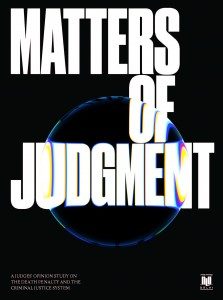
New Death Penalty Report Reveals Widespread Concern Among Former Supreme Court Judges About A Crisis in India's Criminal Justice System
- News
- 11 Dec 2017
A new research study, Matters of Judgement, sheds fresh light on the complicated and sometimes troubling views of India’s most senior judges towards the death penalty and the administration of justice in India. Interviews were conducted with 60 former Supreme Court judges in an unprecedented research project undertaken by the National Law University in Delhi, in association with The Death Penalty Project.
The findings reveal an overwhelming sense of concern amongst judges, pointing to a crisis in India’s criminal justice system. Speaking with remarkable openness, a majority of former judges interviewed acknowledged that widespread use of torture, fabrication of evidence in criminal investigations and a broken legal aid system left India vulnerable to wrongful convictions. However, such concerns about the integrity of the criminal justice process did not significantly affect judicial support for the death penalty, or views on future abolition.
The report highlights inconsistency and confusion in judicial interpretations of the legal principle used by the courts in India to determine when the death penalty should be imposed. Understanding of the ‘rarest of the rare’ doctrine – which means the death penalty can only be imposed in exceptional circumstances – varied significantly among the former judges. Differing opinions over what constitutes an aggravating or mitigating feature in a case creates a deadly lottery whereby a defendant sentenced to hang in one courtroom may have had his life spared in another. As one judge put it:
“I find it horrible and terrifying, the subjective element in death penalty sentencing”
Judicial concerns about the fairness of India’s criminal justice system are especially worrying given the large numbers of individuals sentenced to death by the Indian courts each year. The study therefore raises serious questions about the legitimacy of the death penalty in India.
Saul Lehrfreund, Co-executive Director of the Death Penalty Project says:
“It is extremely powerful to hear some of India’s most eminent judicial authorities acknowledge what we, as death penalty lawyers, have always known – that an element of personal bias and arbitrariness is inevitable within any criminal justice system. Given the disconnect between discussions on the criminal justice system and an apparent confidence in administering the death penalty, we hope that the research will open up new conversations on a system plagued by torture, arbitrary sentencing and wrongful convictions.”
Notes to Editors
The Death Penalty Project worked closely with the research team at the Centre on the Death Penalty at the National Law University, Delhi as well as consultants Professor Carolyn Hoyle, University of Oxford and Dr Mai Sato, University of Reading, on the design and delivery of this study. Related media articles Report ‘Matters of judgment’ on death penalty published at National Law University, The Indian Express, 8 December 2017 Torture widespread, legal aid system unsatisfactory: SC ex-judges in study, The Indian Express, 9 December 2017 Former judges flay country’s legal aid system, Outlook, 9 December 2017 New study: Former top judges acknowledge crisis in criminal justice system, yet back death penalty, Scroll, 8 December 2017 Most Former SC Judges Believe in Death Penalty, But Don’t Have Faith in Criminal Justice System: Report, The Wire, 8 December 2017 No uniformity on rarest of rare doctrine in awarding death, The New Indian Express, 8 December 2017 Explained: Death Penalty- Matters Of Judgment, LiveLaw, 12 December 2017 Should death penalty be abolished? Study presents a firm argument, India Today, 10 December 2017 Forcing confession by torture rampant in country, first of its kind report reveals, India Today, 10 December 2017

















